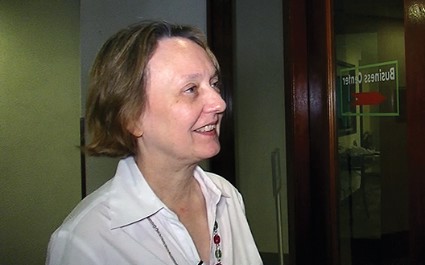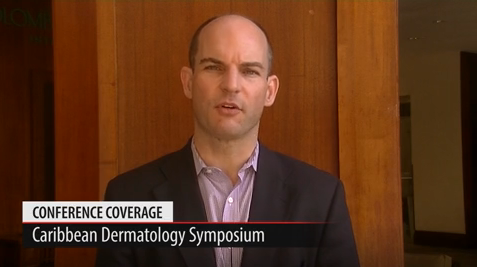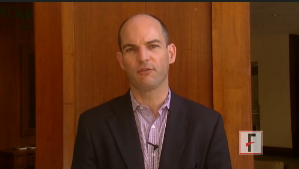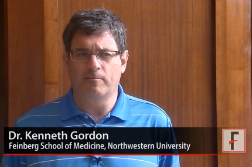User login
Annual Caribbean Dermatology Symposium
AUDIO: Chemotherapy toxicities masquerade as skin disease
PALM BEACH, ARUBA – Chemotherapy can trigger a host of skin presentations, the specific histologies of which may not be as recognizable to oncologists and hematologists as they would be to dermatologists and primary care physicians. Dr. Jean L. Bolognia, professor of dermatology and vice chair of clinical affairs at Yale University, New Haven, Conn., suggests that by using the all-encompassing clinical term "toxic erythema of chemotherapy," a common ground can be established between all members of a patient’s cancer treatment team, and better outcomes achieved.
In this podcast, Dr. Bolognia offers clinicians specifics for determining when a patient is experiencing a cutaneous reaction to chemotherapy or biologics vs. other skin diseases, and suggests ways to adjust treatment to lessen skin reactions. "It requires adjusting some of the misconceptions about drug eruptions," advises Dr. Bolognia. "This is a toxic reaction, not an allergic one." The distinction is important, according to Dr. Bolognia, especially if the patient is responding to their primary treatment; rather than stop a medication, the timing and dosage can be changed.
Among other tips, such as which drugs create certain drug eruptions, Dr. Bolognia reminds dermatologists and primary care clinicians including physician’s assistants that even a month after treatment, cutaneous reactions are possible.
On Twitter @whitneymcknight
PALM BEACH, ARUBA – Chemotherapy can trigger a host of skin presentations, the specific histologies of which may not be as recognizable to oncologists and hematologists as they would be to dermatologists and primary care physicians. Dr. Jean L. Bolognia, professor of dermatology and vice chair of clinical affairs at Yale University, New Haven, Conn., suggests that by using the all-encompassing clinical term "toxic erythema of chemotherapy," a common ground can be established between all members of a patient’s cancer treatment team, and better outcomes achieved.
In this podcast, Dr. Bolognia offers clinicians specifics for determining when a patient is experiencing a cutaneous reaction to chemotherapy or biologics vs. other skin diseases, and suggests ways to adjust treatment to lessen skin reactions. "It requires adjusting some of the misconceptions about drug eruptions," advises Dr. Bolognia. "This is a toxic reaction, not an allergic one." The distinction is important, according to Dr. Bolognia, especially if the patient is responding to their primary treatment; rather than stop a medication, the timing and dosage can be changed.
Among other tips, such as which drugs create certain drug eruptions, Dr. Bolognia reminds dermatologists and primary care clinicians including physician’s assistants that even a month after treatment, cutaneous reactions are possible.
On Twitter @whitneymcknight
PALM BEACH, ARUBA – Chemotherapy can trigger a host of skin presentations, the specific histologies of which may not be as recognizable to oncologists and hematologists as they would be to dermatologists and primary care physicians. Dr. Jean L. Bolognia, professor of dermatology and vice chair of clinical affairs at Yale University, New Haven, Conn., suggests that by using the all-encompassing clinical term "toxic erythema of chemotherapy," a common ground can be established between all members of a patient’s cancer treatment team, and better outcomes achieved.
In this podcast, Dr. Bolognia offers clinicians specifics for determining when a patient is experiencing a cutaneous reaction to chemotherapy or biologics vs. other skin diseases, and suggests ways to adjust treatment to lessen skin reactions. "It requires adjusting some of the misconceptions about drug eruptions," advises Dr. Bolognia. "This is a toxic reaction, not an allergic one." The distinction is important, according to Dr. Bolognia, especially if the patient is responding to their primary treatment; rather than stop a medication, the timing and dosage can be changed.
Among other tips, such as which drugs create certain drug eruptions, Dr. Bolognia reminds dermatologists and primary care clinicians including physician’s assistants that even a month after treatment, cutaneous reactions are possible.
On Twitter @whitneymcknight
EXPERT ANALYSIS FROM CARIBBEAN DERMATOLOGY SYMPOSIUM 2014
Are You Using These Treatments for Your Patients With Actinic Keratoses?
ARUBA – Patients with actinic keratoses are a fixture in most dermatology practices, but is your practice up to date on the full range of treatments available?
At the Caribbean Dermatology Symposium, Dr. David Pariser presented a quick run-down of current, new, and up-and-coming treatments for AKs, including, but not limited to, cryosurgery and imiquimod.
Also, he discusses his experience with field therapy to treat AKs.
"The damage that occurred that caused the actinic keratosis in one specific spot has also occurred in adjacent areas," that can’t be detected visually, he said.
Dr. Pariser is a professor of clinical dermatology at Eastern Virginia Medical School in Norfolk, and a physician in a private group practice in Virginia.
On Twitter @whitneymcknight
ARUBA – Patients with actinic keratoses are a fixture in most dermatology practices, but is your practice up to date on the full range of treatments available?
At the Caribbean Dermatology Symposium, Dr. David Pariser presented a quick run-down of current, new, and up-and-coming treatments for AKs, including, but not limited to, cryosurgery and imiquimod.
Also, he discusses his experience with field therapy to treat AKs.
"The damage that occurred that caused the actinic keratosis in one specific spot has also occurred in adjacent areas," that can’t be detected visually, he said.
Dr. Pariser is a professor of clinical dermatology at Eastern Virginia Medical School in Norfolk, and a physician in a private group practice in Virginia.
On Twitter @whitneymcknight
ARUBA – Patients with actinic keratoses are a fixture in most dermatology practices, but is your practice up to date on the full range of treatments available?
At the Caribbean Dermatology Symposium, Dr. David Pariser presented a quick run-down of current, new, and up-and-coming treatments for AKs, including, but not limited to, cryosurgery and imiquimod.
Also, he discusses his experience with field therapy to treat AKs.
"The damage that occurred that caused the actinic keratosis in one specific spot has also occurred in adjacent areas," that can’t be detected visually, he said.
Dr. Pariser is a professor of clinical dermatology at Eastern Virginia Medical School in Norfolk, and a physician in a private group practice in Virginia.
On Twitter @whitneymcknight
EXPERT ANALYSIS FROM THE CARIBBEAN DERMATOLOGY SYMPOSIUM
AUDIO: Are you using these treatments for your patients with actinic keratoses?
ARUBA – Patients with actinic keratoses are a fixture in most dermatology practices, but is your practice up to date on the full range of treatments available?
At the Caribbean Dermatology Symposium, Dr. David Pariser presented a quick run-down of current, new, and up-and-coming treatments for AKs, including, but not limited to, cryosurgery and imiquimod.
Also, he discusses his experience with field therapy to treat AKs.
"The damage that occurred that caused the actinic keratosis in one specific spot has also occurred in adjacent areas," that can’t be detected visually, he said.
Dr. Pariser is a professor of clinical dermatology at Eastern Virginia Medical School in Norfolk, and a physician in a private group practice in Virginia.
On Twitter @whitneymcknight
ARUBA – Patients with actinic keratoses are a fixture in most dermatology practices, but is your practice up to date on the full range of treatments available?
At the Caribbean Dermatology Symposium, Dr. David Pariser presented a quick run-down of current, new, and up-and-coming treatments for AKs, including, but not limited to, cryosurgery and imiquimod.
Also, he discusses his experience with field therapy to treat AKs.
"The damage that occurred that caused the actinic keratosis in one specific spot has also occurred in adjacent areas," that can’t be detected visually, he said.
Dr. Pariser is a professor of clinical dermatology at Eastern Virginia Medical School in Norfolk, and a physician in a private group practice in Virginia.
On Twitter @whitneymcknight
ARUBA – Patients with actinic keratoses are a fixture in most dermatology practices, but is your practice up to date on the full range of treatments available?
At the Caribbean Dermatology Symposium, Dr. David Pariser presented a quick run-down of current, new, and up-and-coming treatments for AKs, including, but not limited to, cryosurgery and imiquimod.
Also, he discusses his experience with field therapy to treat AKs.
"The damage that occurred that caused the actinic keratosis in one specific spot has also occurred in adjacent areas," that can’t be detected visually, he said.
Dr. Pariser is a professor of clinical dermatology at Eastern Virginia Medical School in Norfolk, and a physician in a private group practice in Virginia.
On Twitter @whitneymcknight
EXPERT ANALYSIS FROM THE CARIBBEAN DERMATOLOGY SYMPOSIUM
VIDEO: Practice pearls improve acne treatment
PALM BEACH, ARUBA – Which combination of retinoids and antibiotics delivers the best acne outcomes? And what dietary advice maximizes isotretinoin’s effectiveness? Dr. Guy Webster of the Wilmington (Del.) Veterans Affairs Medical Center discusses the right combination and timing of treatment with antibiotics and retinoids, offers tips for taking isotretinoin correctly, explains his approach to topical treatment of truncal acne, and outlines what to do when isotretinoin use triggers acne fulminans.
PALM BEACH, ARUBA – Which combination of retinoids and antibiotics delivers the best acne outcomes? And what dietary advice maximizes isotretinoin’s effectiveness? Dr. Guy Webster of the Wilmington (Del.) Veterans Affairs Medical Center discusses the right combination and timing of treatment with antibiotics and retinoids, offers tips for taking isotretinoin correctly, explains his approach to topical treatment of truncal acne, and outlines what to do when isotretinoin use triggers acne fulminans.
PALM BEACH, ARUBA – Which combination of retinoids and antibiotics delivers the best acne outcomes? And what dietary advice maximizes isotretinoin’s effectiveness? Dr. Guy Webster of the Wilmington (Del.) Veterans Affairs Medical Center discusses the right combination and timing of treatment with antibiotics and retinoids, offers tips for taking isotretinoin correctly, explains his approach to topical treatment of truncal acne, and outlines what to do when isotretinoin use triggers acne fulminans.
ANALYSIS FROM THE CARIBBEAN DERMATOLOGY SYMPOSIUM
VIDEO: Don’t overlook the signs of psoriatic arthritis
PALM BEACH, ARUBA – When evaluating patients for psoriasis, don’t forget to ask them about potential symptoms of psoriatic arthritis, cautions Dr. Mark Jackson of the University of Louisville. In an interview at the Caribbean Dermatology Seminar, Dr. Jackson also discusses the need to have psoriasis patients without psoriatic arthritis be alert to the development of potential symptoms of the joint disease.
The video associated with this article is no longer available on this site. Please view all of our videos on the MDedge YouTube channel
PALM BEACH, ARUBA – When evaluating patients for psoriasis, don’t forget to ask them about potential symptoms of psoriatic arthritis, cautions Dr. Mark Jackson of the University of Louisville. In an interview at the Caribbean Dermatology Seminar, Dr. Jackson also discusses the need to have psoriasis patients without psoriatic arthritis be alert to the development of potential symptoms of the joint disease.
The video associated with this article is no longer available on this site. Please view all of our videos on the MDedge YouTube channel
PALM BEACH, ARUBA – When evaluating patients for psoriasis, don’t forget to ask them about potential symptoms of psoriatic arthritis, cautions Dr. Mark Jackson of the University of Louisville. In an interview at the Caribbean Dermatology Seminar, Dr. Jackson also discusses the need to have psoriasis patients without psoriatic arthritis be alert to the development of potential symptoms of the joint disease.
The video associated with this article is no longer available on this site. Please view all of our videos on the MDedge YouTube channel
FROM THE CARIBBEAN DERMATOLOGY SEMINAR
VIDEO: New and upcoming topical antifungals
PALM BEACH, ARUBA – Systemic therapy is currently the standard of treatment for onychomycosis, but Dr. David Pariser discusses several new topical antifungals – efinaconazole, tavaborole, and luliconazole – that may be available in the next year to improve therapy options for patients.
The video associated with this article is no longer available on this site. Please view all of our videos on the MDedge YouTube channel
PALM BEACH, ARUBA – Systemic therapy is currently the standard of treatment for onychomycosis, but Dr. David Pariser discusses several new topical antifungals – efinaconazole, tavaborole, and luliconazole – that may be available in the next year to improve therapy options for patients.
The video associated with this article is no longer available on this site. Please view all of our videos on the MDedge YouTube channel
PALM BEACH, ARUBA – Systemic therapy is currently the standard of treatment for onychomycosis, but Dr. David Pariser discusses several new topical antifungals – efinaconazole, tavaborole, and luliconazole – that may be available in the next year to improve therapy options for patients.
The video associated with this article is no longer available on this site. Please view all of our videos on the MDedge YouTube channel
EXPERT ANALYSIS FROM THE CARIBBEAN DERMATOLOGY SYMPOSIUM
VIDEO: How to evaluate the need for systemic psoriasis therapy
PALM BEACH, ARUBA – When is it time to transition a patient with psoriasis from topical therapy to systemic therapy? Dr. Mark Jackson of the University of Louisville (Ky.) discusses how to evaluate the need for a new treatment approach, and how to help patients make the transition to systemic therapy. We caught up with Dr. Jackson in this video interview at the Caribbean Dermatology Seminar.
The video associated with this article is no longer available on this site. Please view all of our videos on the MDedge YouTube channel
PALM BEACH, ARUBA – When is it time to transition a patient with psoriasis from topical therapy to systemic therapy? Dr. Mark Jackson of the University of Louisville (Ky.) discusses how to evaluate the need for a new treatment approach, and how to help patients make the transition to systemic therapy. We caught up with Dr. Jackson in this video interview at the Caribbean Dermatology Seminar.
The video associated with this article is no longer available on this site. Please view all of our videos on the MDedge YouTube channel
PALM BEACH, ARUBA – When is it time to transition a patient with psoriasis from topical therapy to systemic therapy? Dr. Mark Jackson of the University of Louisville (Ky.) discusses how to evaluate the need for a new treatment approach, and how to help patients make the transition to systemic therapy. We caught up with Dr. Jackson in this video interview at the Caribbean Dermatology Seminar.
The video associated with this article is no longer available on this site. Please view all of our videos on the MDedge YouTube channel
EXPERT ANALYSIS FROM THE CARIBBEAN DERMATOLOGY SEMINAR
VIDEO: Take the ‘whole’ approach to treating psoriasis patients
PALM BEACH, ARUBA – Dr. Kenneth Gordon, professor of dermatology at Northwestern University, Chicago, explains why it’s important to treat not just the physical manifestations of psoriasis, but also to consider the condition’s emotional and practical aspects for patients. He made his comments in a video interview during the Caribbean Dermatology Symposium.
The video associated with this article is no longer available on this site. Please view all of our videos on the MDedge YouTube channel
PALM BEACH, ARUBA – Dr. Kenneth Gordon, professor of dermatology at Northwestern University, Chicago, explains why it’s important to treat not just the physical manifestations of psoriasis, but also to consider the condition’s emotional and practical aspects for patients. He made his comments in a video interview during the Caribbean Dermatology Symposium.
The video associated with this article is no longer available on this site. Please view all of our videos on the MDedge YouTube channel
PALM BEACH, ARUBA – Dr. Kenneth Gordon, professor of dermatology at Northwestern University, Chicago, explains why it’s important to treat not just the physical manifestations of psoriasis, but also to consider the condition’s emotional and practical aspects for patients. He made his comments in a video interview during the Caribbean Dermatology Symposium.
The video associated with this article is no longer available on this site. Please view all of our videos on the MDedge YouTube channel
ANALYSIS FROM THE CARIBBEAN DERMATOLOGY SYMPOSIUM
VIDEO: A new look at three common pediatric dermatology presentations
PALM BEACH, ARUBA – In a video interview at the Caribbean Dermatology Symposium, Dr. Fred Ghali gives expert analysis on how to approach new variants of hand-foot-mouth disease; car- and toilet-seat contact dermatitis; and off-label treatment of small hemangiomas.
The video associated with this article is no longer available on this site. Please view all of our videos on the MDedge YouTube channel
PALM BEACH, ARUBA – In a video interview at the Caribbean Dermatology Symposium, Dr. Fred Ghali gives expert analysis on how to approach new variants of hand-foot-mouth disease; car- and toilet-seat contact dermatitis; and off-label treatment of small hemangiomas.
The video associated with this article is no longer available on this site. Please view all of our videos on the MDedge YouTube channel
PALM BEACH, ARUBA – In a video interview at the Caribbean Dermatology Symposium, Dr. Fred Ghali gives expert analysis on how to approach new variants of hand-foot-mouth disease; car- and toilet-seat contact dermatitis; and off-label treatment of small hemangiomas.
The video associated with this article is no longer available on this site. Please view all of our videos on the MDedge YouTube channel
ANALYSIS FROM THE CARIBBEAN DERMATOLOGY SYMPOSIUM






